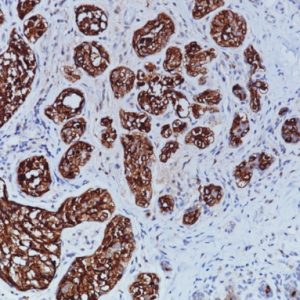Description
CD247 is a 16-kDa T-cell surface glycoprotein, also known as CD3 zeta-chain or T-cell antigen receptor (TCR)-Z, which constitutes part of the TCR complex. CD247 is a crucial molecule in the structure, expression, and function of TCR and natural killer (NK) cell-activating receptors. When CD247 is downregulated, T-cell responsiveness and proliferative capacity will be altered (1).
CD247 staining was observed in various proportions of tumor cells and tumor-infiltrating lymphocytes (TILs), localized in the cytoplasm. Reduced levels of CD247 in both TILs and peripheral blood lymphocytes are associated with many cancers including gastric carcinoma, head and neck cancer, B-cell lymphoma, and renal carcinoma. CD247 plays an important role in signal transduction and may be used as a biomarker for evaluating the status of the immune system (2,3). Studies suggest that CD247 may be a therapeutic target for ovarian cancer treatment (1).
Want to Learn More About CD247 Antibody? Download Our Complimentary White Paper!
SPECIFICATIONS
Specifications
| INTENDED USE | IVD |
|---|---|
| FORMAT | Concentrate, Predilute |
| VOLUME | 0.1 ml, 1.0 ml, 6.0 ml |
| SOURCE | Rabbit Monoclonal |
| CLONE | BL-336-1B2 |
| SPECIES REACTIVITY | Human; others not tested |
| ISOTYPE | IgG |
| POSITIVE CONTROL | Tonsil |
DATASHEET & SDS
REFERENCES
1. Ye W, Zhou Y, Xu B, et al. CD247 expression is associated with differentiation and classification in ovarian cancer. Medicine (Baltimore).
2019;98(51): e18407.
2. Tartour E, Latour S, Mathiot C, et al. Variable expression of CD3‐ ζ chain
in tumor‐ infiltrating lymphocytes (TIL) derived from renal‐ cell carcinoma:
Relationship with TIL phenotype and function.
Int. J. Cancer.1995; 63: 205-212.
3. Wang Q, Li P, Wu W. A systematic analysis of immune genes and overall
survival in cancer patients. BMC Cancer. 2019;19(1):1225.
4. Center for Disease Control Manual. Guide: Safety Management, NO. CDC-
22, Atlanta, GA. April 30, 1976 “Decontamination of Laboratory Sink Drains
to Remove Azide Salts.”
5. Clinical and Laboratory Standards Institute (CLSI). Protection of
Laboratory Workers from Occupationally Acquired Infections; Approved
Guideline-Fourth Edition CLSI document M29-A4 Wayne, PA 2014.








Reviews
There are no reviews yet.